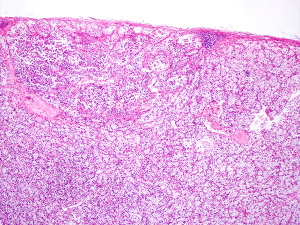Expanded Indication for Kidney Cancer Drug
Belzutifan is now available for certain patients with kidney cancer whether or not they have von Hippel-Lindau disease.
The U.S. Food and Drug Administration (FDA) has approved belzutifan (Welireg) for the treatment of patients with advanced renal cell carcinoma (RCC) following immune checkpoint inhibitor therapy targeting PD-1 or PD-L1 and an inhibitor of vascular endothelial growth factor (VEGF) signaling.

Belzutifan is a small molecule inhibitor of a protein called hypoxia-inducible factor 2α (HIF2α), which allows cells to grow in low-oxygen conditions characteristic of solid tumors. In August 2021, belzutifan was first approved to treat certain tumors, including RCC, that occurred in patients with von Hippel-Lindau (VHL) disease, a rare genetic disease caused by a mutation in the VHL tumor suppressor gene. The latest approval allows belzutifan to be used for the treatment of RCC in some patients without VHL disease.
The approval was based on results from the open-label, randomized, head-to-head, phase III LITESPARK-005 clinical trial that recruited 746 patients with unresectable locally advanced or metastatic clear cell RCC that had progressed after treatment with a PD-1 or PD-L1 inhibitor and an inhibitor of VEGF signaling. Patients were randomly assigned 1:1 to receive belzutifan or everolimus (Afinitor), an inhibitor of the cancer-promoting protein mTOR.
Patients receiving belzutifan were 25% less likely to experience disease progression or death than patients receiving everolimus. Although overall survival data were immature at the time of data cut-off, the researchers reported that patients in the belzutifan arm trended toward having no worse survival than patients in the everolimus arm.
RCC is a cancer that arises in the kidneys. According to federal statistics, it was estimated that 81,800 individuals would be diagnosed with kidney cancer and 14,890 patients would die of the disease in the United States in 2023.
The FDA rendered its decision on December 14, 2023.
